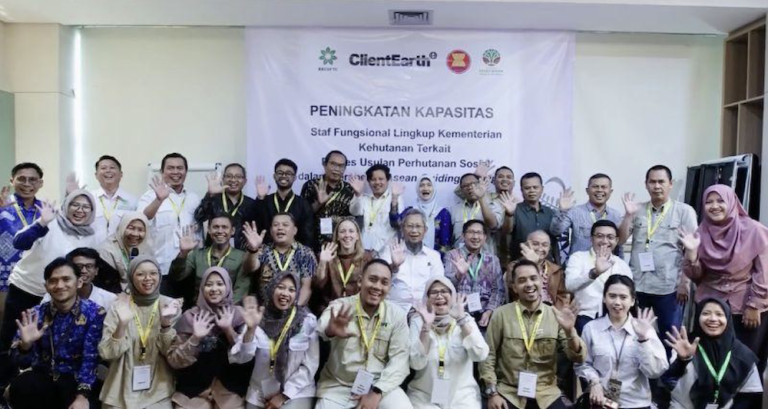Jakarta — RECOFTC Indonesia, in partnership with the Ministry of Forestry, ASEAN, and environmental law organisation ClientEarth, has launched a national training program to enhance the capacity of social forestry facilitators and staff. ClientEarth said in a statement on Tuesday, October 28, said the program aligns Indonesia’s social forestry practices with the ASEAN Guiding Principles (AGP) for Effective Social Forestry Legal Frameworks.
The three-day training, held from 28–30 October in Jakarta, gathered facilitators, forestry officers, and local government staff from provinces including Lampung, West Nusa Tenggara, West Java, Bogor, and Yogyakarta. Participants represent Provincial Forestry and Environment Offices, Social Forestry Centres, and the Directorate of Social Forestry Management.
Strengthening rights-based and participatory forestry
The initiative aims to improve the technical and institutional understanding of participatory, transparent, and rights-based social forestry licensing procedures. “Through this training, we want to bridge policies and realities on the ground,” said Gamma Galudra, Director of RECOFTC Indonesia, highlighting the importance of ensuring that community forestry aligns with good governance standards across ASEAN.
The program aims to provide community access to manage 12.7 million hectares of forest through the Indicative Map of Social Forestry Areas (PIAPS), which is now in its ninth revision. It also integrates initiatives such as the Integrated Area Development (IAD) program in 62 districts to foster collaboration among government, private sector, academia, media, and communities.
“Social forestry positions local and customary communities as the main actors in managing forests to achieve social, economic, and ecological well-being,” said Ahmad Dany Sunandar, Head of the Sub-Directorate for Social Forestry Approval Preparation at the Directorate General of Social Forestry, Ministry of Forestry, emphasising its growing role in food security, renewable energy, and sustainable forest management.
During the training, participants discussed real-life cases from Lampung, Lombok, East Flores, Simalungun, and Teluk Jambe, as well as findings from ClientEarth’s Legal Gap Assessment, which compared Indonesia’s policies with ASEAN Guiding Principles.
“The ASEAN Guiding Principles can serve as a baseline to strengthen the development and implementation of national legal frameworks and policies on social forestry, particularly to increase local communities’ access,” said Amalia Rodriguez Fajardo, Legal and Policy Advisor at ClientEarth. (nsh)
Banner photo: ClientEarth















